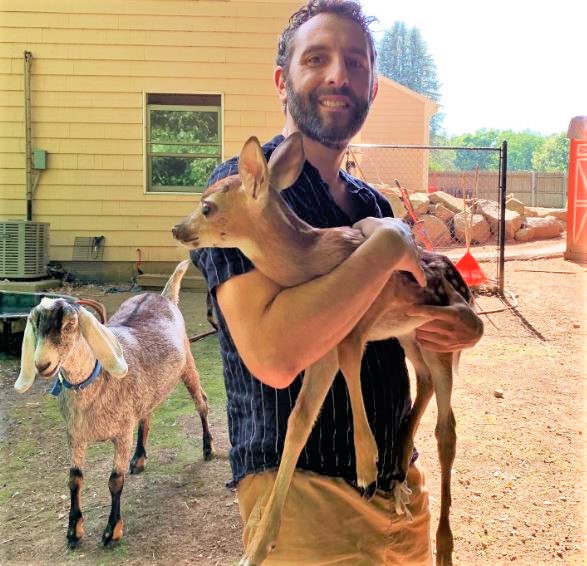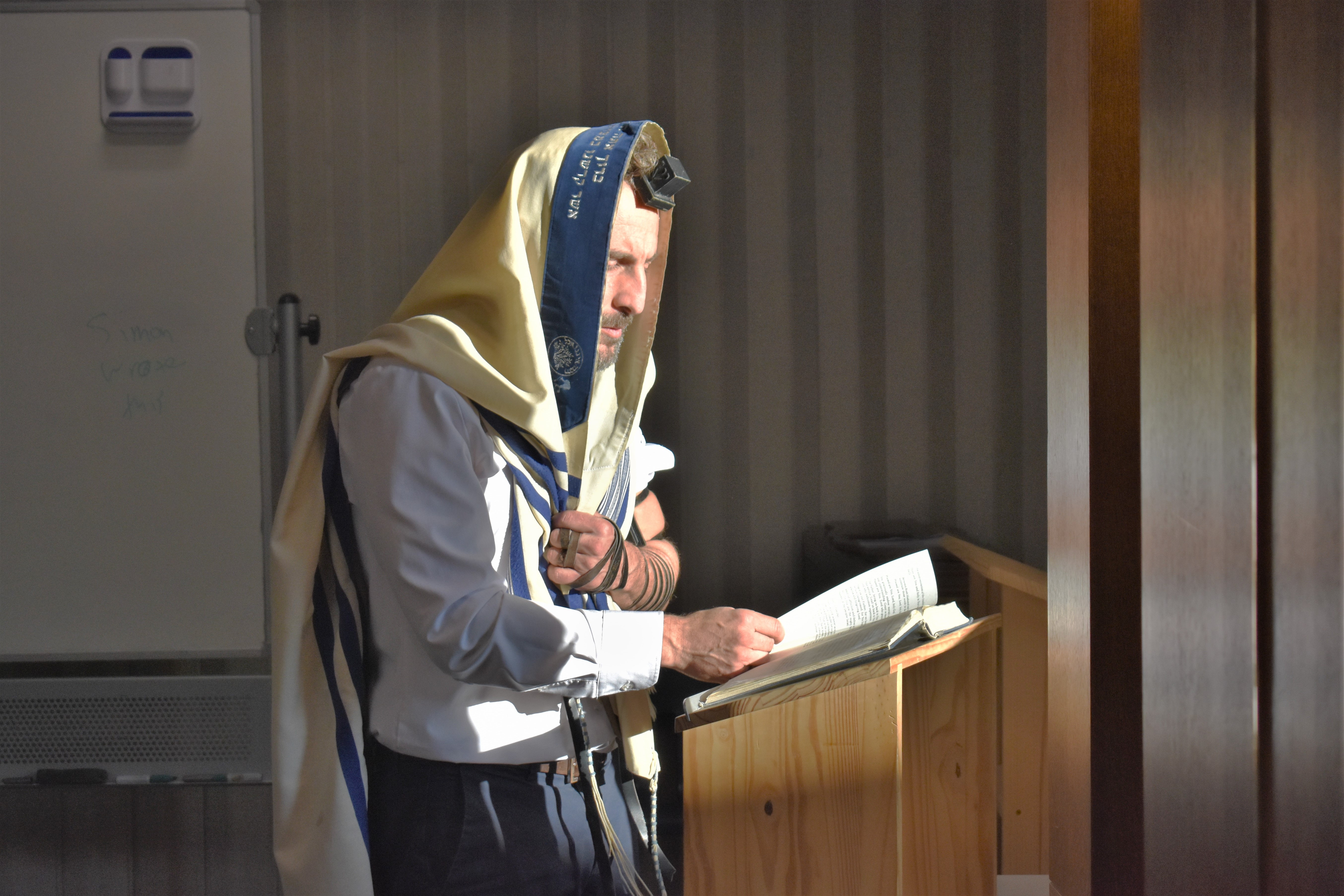Rabbi Aaron Philmus, Hyman Brand Hebrew Academy’s new school rabbi, strongly believes in the value of the natural world in Jewish education.
Since August, Rabbi Philmus has been teaching middle and high school classes at HBHA while simultaneously working with all grades and teachers as the school’s rabbi.
Previously the senior rabbi at Temple Torat Yisrael in East Greenwich, Rhode Island, Rabbi Philmus’s first few months at HBHA were “very exciting, exhilarating and challenging.” His classes and beliefs put the Earth and God’s creations first and foremost as a way to directly connect with Judaism.
Now in Overland Park, Kansas, Rabbi Philmus began as school rabbi at HBHA with the goal of taking “the seeds [of the Torah] that have been lying dormant and giving them life and germinating them.” He has learned many aspects of working at a day school and developing class curricula on the job.
“As a pulpit rabbi, I wasn't teaching classes every single day,” he said. “I'm kind of a perfectionist, and I would tend to spend a lot of time working on something for one week as opposed to this experience, which is teaching three classes — and they are new subjects for the school. There's no existing curriculum.
“We've been teaching these subjects for thousands of years,” he continued. “You would think that there's [certain curricula] existing, but not really. The more I talk to Jewish educators from other schools, they say the same thing: ‘Yeah, I had to kind of create it from scratch.’”
Rabbi Philmus’s educational philosophy and views on Judaism are at the forefront of his teaching. He also believes in the importance of personal belief and connection, rather than blind tradition.
“I want to provide opportunities for people — particularly young people — to explore [religious] questions themselves and not just sort of accept and take what we're trying to teach them from the past,” he said. “Judaism should be forward-looking, it should be countercultural, a force that looks to the future… [We should] strive to be more true and authentic on a personal level for each of us and not just be… copying the ways of what our parents did.”
Next semester, Rabbi Philmus will teach the core elective class “Introduction to Earth-based Judaism.” He plans on going with the class to locations such as Mitzvah Garden KC to have experiential education beyond studying the Jewish texts.
Rabbi Philmus’s own Jewish path started as he grew up in New Jersey. His father was the president of the local Conservative synagogue, and though the family wasn’t “super observant,” they were deeply involved.
While studying at the University of Massachusetts Amherst, Rabbi Philmus began to dig deeper into his Jewish roots and his connection with the Earth. He earned a bachelor’s degree in natural resources/conservation, but he gained even more knowledge from his initial awakenings to the spiritual world through nature. In addition to ecology, he studied indigenous cultures such as the Native Americans and Aborigines of Australia. Through these studies, he discovered self-isolated meditations, later realizing that Judaism’s form of it is called hitbodedut.
“I didn't know that it was called [hitbodedut] at that time, but I was spending a lot of time in nature by myself, observing in wonder of the wisdom of Hashem and creation, and connecting with the spiritual power of the elements of nature and different plants and animals,” Rabbi Philmus said. “I started to really feel like there was something mysterious and greater than myself.”
Rabbi Philmus became a wildlife ecologist while further developing a drive to learn more about Judaism.
“In time, I started to feel like I wanted to have a cultural container that was my own, to not be talking always about other people's traditions,” he said. “I realized that in order for me to actually dig deeper into the roots of our tradition and to teach, I need to learn more. I knew I loved teaching Torah. I knew that I loved working with people of all ages.”
Already considering rabbinical school, an additional impetus for Rabbi Philmus to choose to go was the Sept. 11, 2001, attacks in New York City. Rabbi Philmus’s father and brother-in-law both had offices in the World Trade Center’s twin towers. Thankfully, his father was not in his office that day, and his brother-in-law escaped the building before it collapsed.
“The whole experience of seeing how religion could be twisted to do something so horrible and destructive made me think, ‘It's not enough just that I'm an environmental educator.’ I need to really learn more so that I can be out front and be a leader in my own community to show that religion can be a force, it's meant to be a force, and it will be a force for healing in the world, even though people often see it as the cause of the problems in the world,” Rabbi Philmus said.
Rabbi Philmus attended and was ordained at the Jewish Theological Seminary in New York City, and subsequently worked at synagogues in San Francisco, California; Newtown, Pennsylvania; and East Greenwich, Rhode Island.
As senior rabbi in East Greenwich, Rabbi Philmus lived at the synagogue’s parsonage and developed a small nature center in which to teach. He and his family tended to multiple goats, chickens and ducks during their eight years there.

“I eventually felt that working in a small synagogue was just limiting for me,” Rabbi Philmus said about his decision to turn to teaching. “I was only seeing the kids once a week — if I was lucky — and in very short, little bursts of time. And so the thought of working in a day school where I could really have daily interaction with the students and also go deeper with them because they're learning more Torah and Hebrew and history was a really exciting opportunity for me.”
HBHA’s current head of school, Adam Tilove, knew Rabbi Philmus; Tilove had been head of a Jewish school in Rhode Island, not too far from Rabbi Philmus in East Greenwich, and the two had worked together before. When learning about Rabbi Philmus’s desire to work at a day school, Tilove recommended he apply to HBHA. (Tilove was not on the board in charge of determining who would be hired for the school rabbi position.)
HBHA, its students, staff and families have impressed Rabbi Philmus. The variety of Jews doesn’t affect the greater value of Ahavat Yisrael (love of fellow Jews), he said. He uses the metaphor that the Jewish people are one body with many different organs to serve many different functions.
“They have to work together in order for the body to be healthy as a whole,” he said. “HBHA is like a little miniature Israel.”
Rabbi Philmus lives in Overland Park with his wife, Valerie, and their three children: Sophie (15), Aeden (12) and Mae (3). He describes the city as a great place to raise a family and having a strong Jewish community.
“I love that this community here is not just fragmented,” he said. “Yes, each group has their own thing, but they very much see themselves as part of a greater community. They work together in many ways that I don't see happening in other parts of the country. That's really special.”




